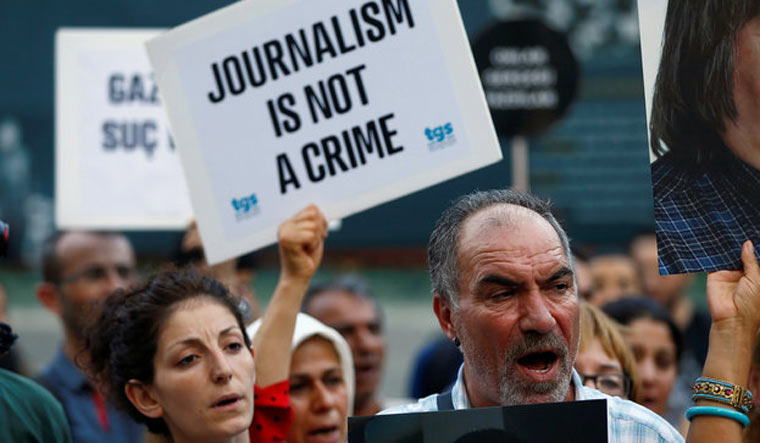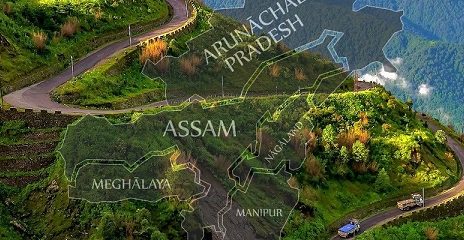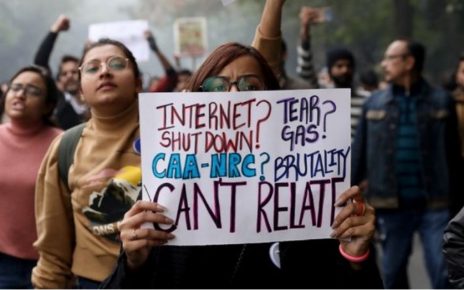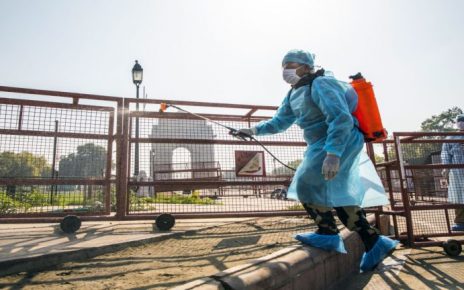The Week
By Puja Awasthi, June 23, 2020
The Peoples’ Union for Civil Liberties (PUCL) has issued a statement demanding that criminalising free speech should be stopped and journalism should be protected.
The statement draws attention to many journalists facing police complaints
under various laws, including the Disaster Management Act, SC/ST (Prevention of Atrocities) Act, besides the Indian Penal Code.
The journalists mentioned in the statement include Supriya Sharma who wrote about the status of the residents of Domari, a village in Varanasi adopted by Prime Minister Narendra Modi.
It also draws attention to Aakar Patel, columnist and activist who had, in the second week of June, tweeted that dalits, minorities and adivasis should rise up against atrocities when highlighting the civil unrest in the USA in the wake of George Floyd’s death. His twitter account was blocked following a demanded by Karnataka state officials.
In Gujarat, Dhaval Patel, editor of a Gujarati news portal, was booked and arrested on May 11, 2020, for sedition for allegedly publishing a ‘speculative’ report on the possible change in leadership in the state due to criticism over the rising COVID-19 count.
On April 6, 2020, Pawan Choudhary, a web journalist, was arrested in Munger in Bihar on charge of spreading misinformation about the death of a COVID-19 patient.
The statement refers to a report by the Rights and Risks Analysis Group titled ‘India: Media’s Crackdown During COVID-19 Lockdown’ which reads, “At least 55 journalists faced arrest, registration of FIRs, summons or show causes notices, physical assaults, alleged destruction of properties and threats for reportage on COVID-19 or exercising freedom of opinion and expression during the national lockdown from 25 March to 31 May, 2020”.
The highest number of attacks on journalists was reported from Uttar Pradesh (11); followed by Jammu & Kashmir (6); Himachal Pradesh (5); four each in Tamil Nadu, West Bengal, Odisha, and Maharashtra; two each in Punjab, Delhi, Madhya Pradesh and Kerala, and one each in Andaman & Nicobar Islands, Arunachal Pradesh, Assam, Bihar, Chhattisgarh, Gujarat, Karnataka, Nagaland and Telangana.
The statement says even journalists who “spew hatred against minorities, intellectuals and dissenters on their prime time slots have had FIRs lodged against them”. It mentions Arnab Goswami of Republic TV, Sudhir Chaudhary of Zee TV and Amish Devgan of News 18.
“Although the PUCL does not agree with their views, it stands by their right to freedom of expression, except when it incites hatred and violence. PUCL believes that the right platform of censure is the Press Council of India and the peer body called the News Broadcasters Association. We would insist that the FIRs lodged should be expeditiously investigated by the police… and proceed to ensure that the trial is speedily concluded and justice delivered. This will generate confidence in the impartiality, independence and fairness of the police,” reads the statement.
The statement makes a special case for Jammu and Kashmir, which it labels as having the “worst scenario for the press”.
Of the cases highlighted in the statement are those against Gowhar Geelani for “glorifying terrorism in Kashmir” through social media posts, the booking of Masrat Zahra under the UAPA for publishing “anti-national” posts on social media and Peerzada Ashiq for a report headlined ‘Kin allowed to exhume bodies of militants in Baramulla’.
“With a new media policy in place, the authorities will go to the extent of deciding on the content that can be reported and published, in the name of tracking fake and anti- national news” reads the statement.
The statement says the body “condemns the attempts to intimidate media persons, thereby stifling the media from playing its role as an independent and critical watchdog of liberty, democracy and governance.”
It further states, “There is a difference between implementing penal laws in an independent, accountable and legal manner and the deliberate and motivated abuse of criminal laws by the police, including in the use of special legislations like the SC & ST (POA) Act, 1987. Ironically, actual victims of caste atrocities and hate crimes find their complaints rejected, whereas the same laws are used against dissenting activists and media persons. When the State and the police abuse the law through fabricated prosecutions, their aim is not eventual convictions, but to lock up people for long periods of time without bail. Unfortunately, in many instances, the judiciary has failed to play a watchdog role…..The media is a vital part of democracy and plays an important role in holding powerful to account. India has had a proud tradition of free and fearless journalism, which played a very important role in the freedom struggle and this should be nurtured. A pandemic and the subsequent lockdown should not be excuses to clamp down on the media”.



